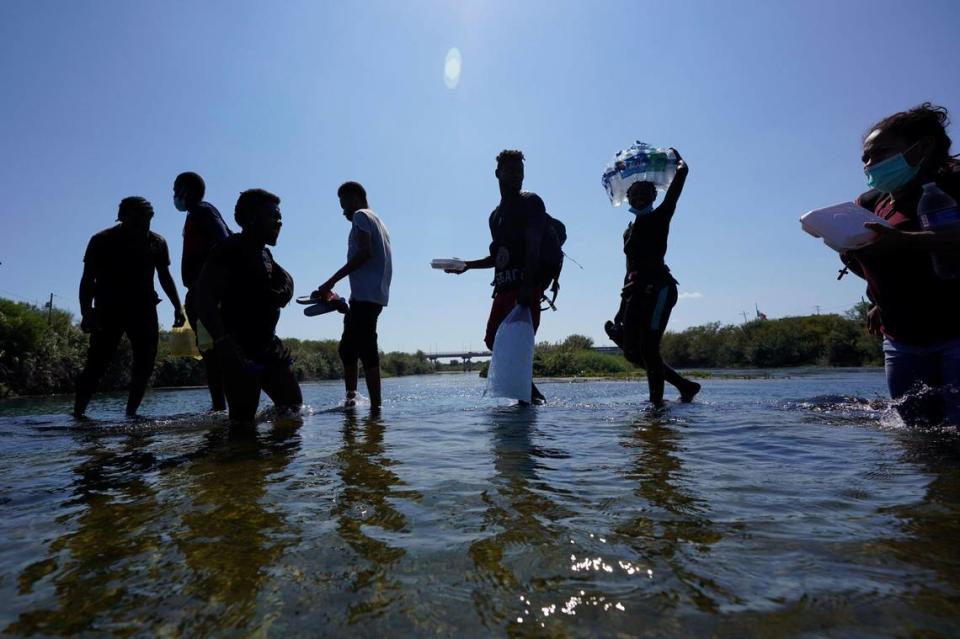Desperation fuels Haitian migrant crisis in Texas, where thousands are staying under a bridge
Lack of access to asylum in the U.S., confusion over U.S. immigration policy and desperation are fueling a surge of Haitian migrants into Del Rio, Texas, where thousands who have arrived in the past few days are living in makeshift conditions under an international bridge.
The surge in migrants at the U.S.-Mexico border garnered international headlines this week when images on Thursday showed more than 9,000 people being held in a temporary staging area under the Del Rio International Bridge.
The U.S Border Patrol, which has set up portable toilets at the site, says it is sending more agents to the area to help process the migrants, who have been crossing the shallow waters of the Rio Grande.
“The majority of the people who are at Del Rio are people who have been in Mexico a very long time but in other cities, for example Tijuana,” said Guerline Jozef, co-founder of the Haitian Bridge Alliance, an advocacy group that was created after the last Haitian migration crisis along the U.S. southern border. “There are a lot of rumors that if you go to Del Rio, you might be able to get access, so people just flooded Del Rio.”
Haitian Foreign Minister Claude Joseph was in Mexico on Friday when the migration crisis was discussed with his ambassador and Mexican officials. Meanwhile, Joseph and other Haitian officials have been told by the Biden administration to expect deportations of Haitians who are under the Del Rio bridge. Those flights will start Sunday.
Jean Négot Bonheur Delva, the head of Haiti’s Office of National Migration (ONM), told the Miami Herald that he did not know how many additional flights were coming. For months, he said, Haiti has been unable to quarantine returning deportees as a precautionary measure against COVID-19 because “there are no means.”
A Biden administration official told the Miami Herald and the McClatchy Washington Bureau the deportations are not targeted at Haitian migrants and are the same enforcement for anyone who enters unlawfully regardless of country of origin.
Haitians and Venezuelans seeking to migrate to Chile now face tougher rules
On Friday, the Federal Aviation Administration placed a two-week flight restriction over the bridge after aerial photos appeared on television and social media of the crush of people under the bridge living in squalid conditions. The decision means news agencies cannot fly drones to capture any images as activists and authorities say the numbers are growing.
In a tweet, U.S. Sen. Ted Cruz, R-Texas, blamed President Joe Biden for what he described as a “man-made disaster.”

“I am on the ground in Del Rio, Texas tonight. As of this moment, there are 10,503 illegal aliens under the Del Rio International Bridge. This man-made disaster was caused by Joe Biden. #BidenBorderCrisis,” Cruz said Thursday.
The influx is quickly becoming a humanitarian crisis and presenting a new challenge for the Biden administration, which has been unable to dissuade migrants from trying to illegally enter the U.S. Biden has been trying to get comprehensive immigration reform with a pathway to citizenship passed in Congress for undocumented migrants living in the United States, while at the same time attempting to control illegal migration at U.S. ports of entry.
In a legal defeat Thursday, a federal judge blocked the Biden administration from sending back migrant families with children apprehended at the border with Mexico, citing the coronavirus emergency. The administration had extended the controversial public health order known as Title 42 invoked by the Trump administration at the beginning of the pandemic, as the number of migrants arriving to the United States increased dramatically this year. Title 42 allows the U.S. to send migrants back to their home countries without an asylum hearing.
At the end of August, the U.S. Supreme Court ordered the Migrant Protection Protocols — informally known as the Remain in Mexico program — to be reinstated, siding with the lower courts. Under the program, asylum seekers need to wait in Mexico for the processing of their cases. The administration said it will continue fighting the decision.
Randy McGrorty, who heads Catholic Legal Services in Miami, said while Haitian migrants appear to account for the majority of those wading across the Rio Grande, there are also Venezuelans, Cubans and some Central Americans. The mix, he said, reflects that the U.S. “border crisis” has shifted away from being solely a Central American crisis.
“Why isn’t the international community responding to what is really turning into a humanitarian crisis?” he said. “I can’t figure it out. There is nothing good about having people living in fields.”
Jozef, whose organization provides assistance to Haitian migrants at the border, said the numbers arriving at the border are growing. Many of the Haitian migrants have been stuck in Mexico for years after making the dangerous trek through the jungles of South America from Brazil and Chile. Others have been stuck in Panama, Nicaragua and other Central American nations after making what has become “an increasingly more difficult journey with people knowing you are traveling with money, with people getting killed and kidnapped.”
U.S. immigration policies “have been pushing people further down south, all the way down to Panama where a lot of people have been stuck for a very long time,” she said.

Another factor, she said is the use of Title 42. Jozef and other activists who have been fighting to end the policy say it has not been a deterrent for desperate migrants.
“Under President Biden alone, as of this week, there have been 36 deportation flights to Haiti,” Jozef said. “What we know from speaking to and serving people at the border is there no deterrent.”
Jozef said interviews with migrants arriving in Del Rio and in Ciudad Acuña, the Mexican city on the other side of the border, reveal that they are being led by rumors that if they go to the Texas port of entry, “they might have access to protection.”
“That’s why people started flooding the area,” she said. “It has been extremely difficult for all migrants at the U.S. Mexico border but specifically Black migrants and Haitians. ... People are extremely desperate.”
Jozef said migrants from other countries have been going to Acuña for a long time, but the Haitian migration is a new phenomenon.
A source at the United Nations’ International Organization for Migration told the Miami Herald the group is closely monitoring the situation at the border and plans to visit Ciudad Acuña next week.
With all of the people going through, authorities on both sides of the borders are not “well-equipped” to handle what is a challenging situation, an IOM official said. Officials in Acuña have established three temporary shelters, but the majority of the migrants are on the U.S. side. The U.N. agency, which does not have a consistent presence in the Mexican city, said it doesn’t know what’s fueling the crush of people suddenly.
“The border is in need of human and material resources to deal with the flow of migrants,” the IOM official said. “The situation merits to have some more support, especially for local authorities.”
U.S. Rep. Ayanna Pressley, co-chair of the House Haiti Caucus, sent a letter Friday asking the Department of Homeland Security to halt deportations to Haiti, expand temporary immigration protections known as TPS, and grant humanitarian parole to Haitians at the border.
“The Biden administration cannot claim it is doing everything it can to support the Haitian community while continuing to unjustly deport Haitians as the island weathers its worst political, public health and economic crises yet,” said Pressley. “We have a moral obligation to lead with compassion. That means immediately halting the cruel and callous deportations of our Haitian neighbors and leveraging every resource available to support those fleeing the humanitarian crisis on the island.”
The letter was signed by another 55 representatives.
Miami Herald Staff Writer Nora Gámez Torres and the McClatchy Washington Bureau’s Bryan Lowry contributed to this report.

